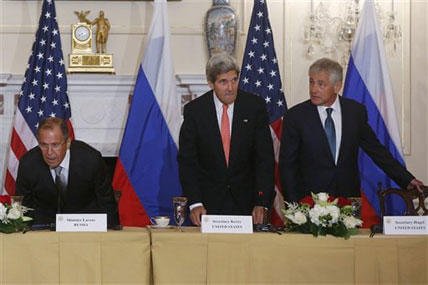Defense Secretary Chuck Hagel met for the first time with his Russian counterpart Friday in an effort to preserve military-to-military ties during what President Obama described as a "pause" in the Moscow-Washington relationship over the asylum grant to leaker Edward Snowden.
Hagel and Russian Defense Minister Sergei Shoygu "agreed that it is time to build a more robust agenda for military cooperation and directed their staffs to put together a plan for more regular and frequent engagement" through joint exercises and training, according to George Little, Hagel's chief spokesman.
Hagel pressed Shoygu for continued Russian cooperation on the withdrawal of U.S. and allied combat forces from Afghanistan and "the leaders also exchanged views on Syria and the importance of supporting a political process to end the violence," Little said in a statement.
Hagel and Shoygu met one-on-one at the State Department ahead of the so-called "two-plus-two" talks of the Russian and U.S. defense chiefs, Secretary of State John Kerry and Russian Foreign Minister Sergei Lavrov.
The talks were initially scheduled to lay the groundwork for a summit between Obama and Russian President Vladimir Putin next month in Moscow, but Obama cancelled the summit after Putin rejected U.S. demands for extradition and instead granted political asylum to former National Security Agency contractor Snowden.
Russian analysts have pointed to the similarities in the tasks faced by Hagel and Shoygu as both try to reshape their militaries under budget constraints.
Hagel has stressed maintaining technological superiority with a smaller Army and Marine Corps. Shoygu must also decide between keeping a large conscription force and following the path of his predecessor Anatoly Serdyukov, who was ousted late last year in a corruption scandal. Serdyukov had argued for a leaner force with more modern equipment.
At a White House news conference before going on a week's vacation, Obama said the Snowden incident was "just one more in a number of emerging differences that we've seen over the last several months.
"It is probably appropriate for us to take a pause, re-assess where it is that Russia is going, what our core interests are, and calibrate the relationship so that we're doing things that are good for the United States and, hopefully, good for Russia as well," Obama said.
At the State Department, Kerry likened the current state of Moscow-Washington relations to a hockey game.
"Sergei Lavrov and I are old hockey players, and we both know that diplomacy, like hockey, can sometimes result in the occasional collision," Kerry said. "So we're candid, very candid, about the areas in which we agree but also the areas in which we disagree."
Both Kerry and Lavrov later said that a Geneva peace conference and a political settlement offered the best hope for resolving the Syrian civil war, but there was little immediate prospect that the rebels or President Bashar al-Assad were ready for talks.
Gen. Martin Dempsey, the chairman of the Joint Chiefs of Staff, was leaving this weekend for talks in Tel Aviv at the invitation of his Israeli counterpart, Lt. Gen. Benny Gantz, to gauge the next steps in Syria for the U.S. The agenda is expected to include discussions about the new leadership in Iran and the ongoing turmoil in Egypt.
The U.S. has pledged small arms and ammunition to the Syrian rebels, but Dempsey has warned against greater U.S. involvement. Dempsey was also going to Jordan, which has taken in hundreds of thousands of Syrian refugees.
Dempsey's visit is preceded by a week-long stay in Israel by Gen. Mark Welsh, the Air Force chief of Staff, for extended talks with the Israeli air chief, Maj.Gen. Amir Eshel.




























